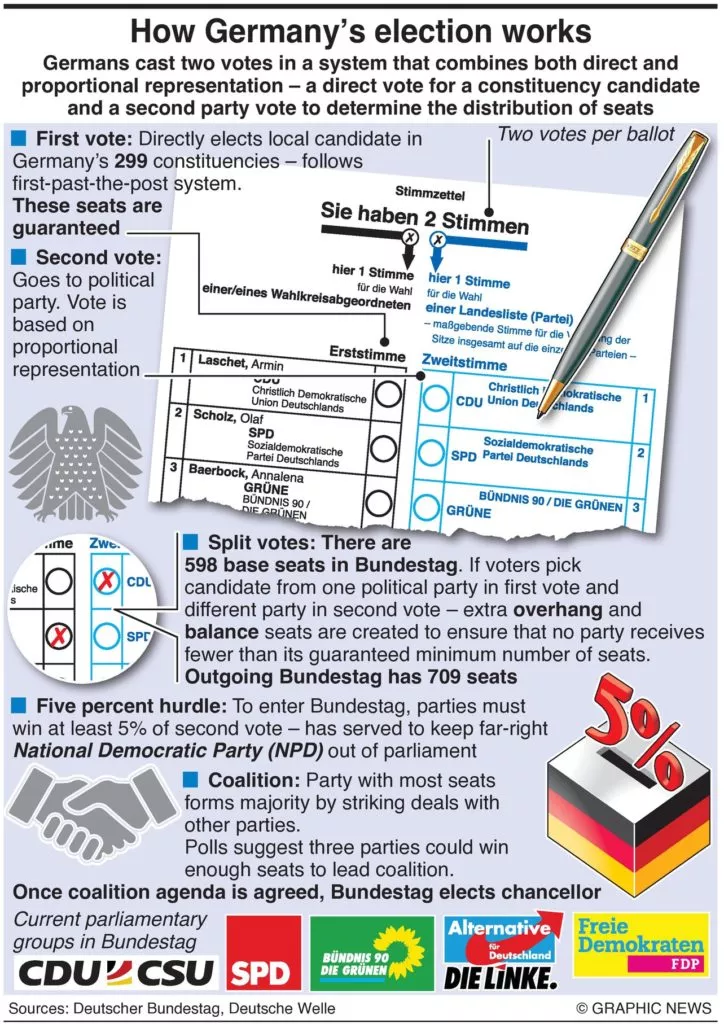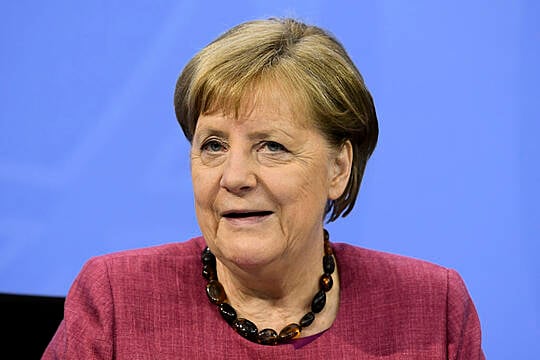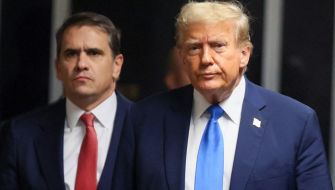The 2021 German federal election will take place on Sunday, September 26th with approximately 62 million voters taking to the polls.
Incumbent chancellor Angela Merkel is not running after 16 years in office, but the Social Democrats (SPD), the Greens and Ms Merkel's own Christian Democratic Union (CDU) will be hoping to secure power. However, smaller parties such as Die Linke and the Free Democrats could have a say in the formation of a coalition.
The German electoral system is baffling even to Germans, with voters casting twice as many votes for 47 parties, leading to a parliament that could have anywhere from 700-1,000 legislators. Here's what you need to know...
How does it work?
Germany's electoral system was designed in reaction to the instability of the interwar Weimar Republic, where splinter parties and repeated elections contributed to the catastrophic rise of Adolf Hitler's Nazis.
It aims to combine the British and US-style direct link between lawmakers and their constituencies with the proportional systems of most of Europe, where parties' seat shares align with their vote shares.
Voters cast two votes: the first for their representative in one of the 299 districts, the second for the party they want in parliament.
All elected district candidates take a seat in parliament. At least 299 more seats are available to ensure that regardless of how many district representatives a party has, the overall balance in parliament reflects the distribution of second votes.

In practice, it takes more than 598 seats to achieve that balance. At the moment, the Bundestag has 709 members, making it the world's largest after China's 3,000-member National People's Congress.
Once, the SPD and the conservative CDU/CSU (Christian Social Union) bloc had a duopoly of district legislators, but with the emergence of a more diverse party spectrum, parliament has grown over past decades.
To limit fragmentation, parties need at least 5 per cent of the vote or to win three individual mandates to get any seats in parliament at all. That led to the pro-business FDP being turfed out of parliament in 2013, and the hard-left Linke could suffer the same fate this year.
The 'elephant's dance'
Within hours of polls closing on Sunday, the leaders of the parties that got into parliament will be interviewed together on television for the "Elephants' Round", a term coined to reflect the stature of the participants in their respective parties. The discussion will give the first indication of what governing alliances are coming.
Typically, the chancellor candidate of the party with the most seats begins talks with the leaders of the parties he or she wants to work with. There is no requirement that the largest party provide the Chancellor, however.
President's time to shine
Ordinarily, the president is confined to cutting ribbons and giving moralising speeches, but Frank-Walter Steinmeier comes into his own after the elections, especially if coalition talks are difficult.
In 2017, the Free Democrats pulled out of three-way talks with the conservatives and the Greens after two months of talks. Mr Steinmeier then stepped in, all but ordering a reluctant SPD to step up.
A "grand coalition" of the conservatives with the SPD took office in March 2018 after the longest government formation process in modern German history.
What are the polls saying?

The race heated up on Thursday as the SPD's lead over the CDU narrowed to just four points.
The SPD, whose candidate for chancellor Olaf Scholz is currently vice chancellor and finance minister in Ms Merkel's grand coalition, slipped one point to 25 per cent, according to the Kantar poll.
Support for the conservative CDU/CSU alliance, whose chancellor candidate is Armin Laschet, rose one percentage point to 22 per cent, while the Greens slipped a point to 16 per cent and the Free Democrats were stuck at 11 per cent.
Polls show Mr Scholz is German voters' most popular choice by far to succeed Ms Merkel.







